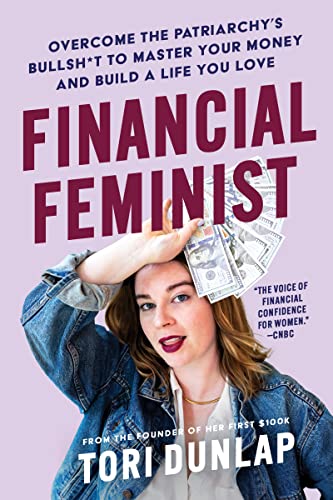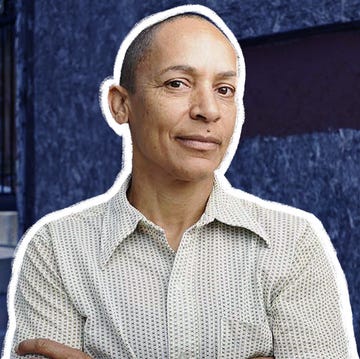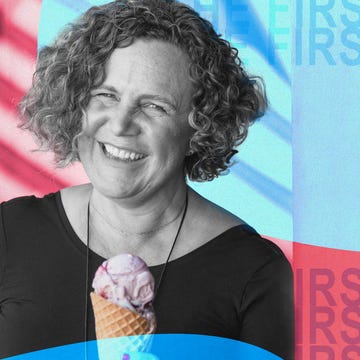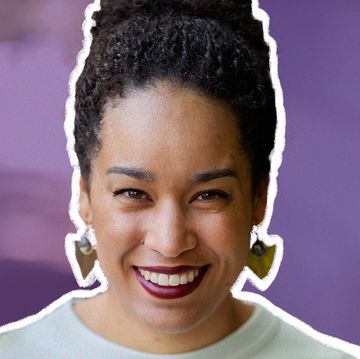In the Shondaland series Financially Fearless, we’re getting candid about how money impacts everyone’s lives. Our solutions will detail how to boost your financial wellbeing, trim overspending, craft a budget, and discuss money matters with loved ones.
It all started as a joke, really.
That’s how Vivian Tu characterizes the humble beginnings of Your Rich BFF, the financial advice platform she launched in January 2021 on TikTok. Initially, making clever, snappy videos about SUBSCRIBE TODAY and trust funds for all was intended to be a resource for Tu’s circle of financially curious friends. Because of her background as a Wall Street trader at J.P. Morgan for more than two years, when she left finance for a career in tech, she was regularly fielding questions about everything from retirement accounts to interest rates.
“A lot of my new coworkers were like, ‘You came from Wall Street; you’re going to rebalance my 401(k),’ and I would laugh at them,” Tu, 28, tells Shondaland. “Because they would be married with two kids in the suburbs, and I was this idiot 24-year-old swinging from the chandeliers of New York City on the weekends.”
Even though this group represented a range of personalities, lifestyles, and goals, Tu realized they would generally ask the same questions.
“I was like, that’s kind of interesting,” she says. “And I got a little tired of answering the same questions over and over again. I was like, guys, leave me alone. I’m going to start my passion project called Your Rich BFF, and I will explain it to you on social media. You can direct your questions there.”
She laughs. Looking back now, it seems flippant — a decidedly unserious endeavor that her network might find informative and helpful. Little did she know just how big her passion project would become in virtually no time at all. Her first video, posted on January 1, 2021, which advised against get-rich-quick techniques via day trading and Bitcoin, went viral, accumulating two and a half million views. By the end of that initial week, she had 100,000 followers on TikTok.
“I had a little bit of an ‘oh, no’ moment,” Tu recalls. “I didn’t even have any idea how to make content. I didn’t know if I was gonna be able to keep up with how much people wanted. I’d been asked thousands of questions, and I was a little frazzled.”
Despite the steep learning curve, she’s managed to produce a piece of content every single day since launching. And while Your Rich BFF has a strong presence across social media platforms, it’s especially formidable on TikTok, where the community has grown to more than two million and counting. Her most popular pieces of content touch on topics like student loans, recession investing, and buying a home.
Tu belongs to the phenomenon dubbed FinTok (short for financial TikTok), a subcommunity on the app where users share finance tips, resources, and general education. Its popularity has skyrocketed in the last two years as a steady stream of economic uncertainty has pushed people to seek out financial advice where they can find it.
“The features of TikTok — easy to search, short videos, and that it has more social cues — make it appealing, and as a result things like financial advice can grow in popularity,” says Natalie Pennington, assistant professor of communication studies at the University of Nevada, Las Vegas.
Pennington, whose research examines how social media users build and maintain relationships, cites a Pew Research Center fact sheet published in August 2022 that shows how TikTok has jumped ahead of almost all social media for teens. Its ubiquity lends itself to subcommunities like FinTok.
“You cannot live in this society without money, unfortunately, and suddenly people are talking about it, which is great, because we’ve been told our entire lives that talking about money is taboo, it’s rude, it’s gauche, it’s tacky,” Tu says. “But now you have this full suite of folks who are talking about money. That’s really making it less scary and less intimidating.”
And the real-world effects of Tu’s content cannot be denied. After telling her followers about the website Missing Money — where people can search for unclaimed money, property, or other assets that might belong to them — one woman reached out and shared her story. As it turned out, she had a late partner who tragically passed away, and she didn’t realize he had a life insurance policy. The woman was the beneficiary. She told Tu that she was going to receive “a life-changing sum of money.”
“I mean, I was in tears,” Tu shares. “What do you say to that? You have made an impact that has completely changed the trajectory of a human being’s life. It’s so powerful.”
Tu’s audience is generally women, people of color, immigrants, LGBTQ+ communities, and other marginalized groups, and putting true wealth in their pockets by putting knowledge in their minds is a form of activism, she argues. “Because as they get wealthier, they’re able to help bring up their communities and educate others.”
That’s precisely what Giovanna Gonzalez is doing with her platform on TikTok, the First Gen Mentor. Although she originally joined TikTok in March 2020, it was meant to be a distraction from the pandemic. Like Tu, she never intended to be a content creator. “I had a fulfilling career in investment management and didn’t even know people could get paid to create content,” Gonzalez, 33, says.
But that changed in March 2021 when she came across a suggested video on TikTok featuring a young white woman bragging about how law school had been easy because both her parents were lawyers. Gonzalez, a first-generation American, immediately thought of all the first-gen students who generally lack the privilege and guidance to navigate academia.
She addressed the issue head-on, posting a TikTok response with an encouraging message to the first-gen community. That was the beginning of her foray into the land of FinTok. The decision came easy for Gonzalez, who had already been doing this type of work in her community, both as a volunteer financial educator at the local YWCA and as a mentor to first-gen students at her alma mater, University of California, Santa Barbara.
“Representation is so important, and when my audience sees a brown, opinionated, curly-haired Latina sharing money tips, they see themselves in me and take action with their finances,” Gonzalez says. “They open that Roth IRA. They start building that emergency fund. They become more economically empowered and lead richer and more fulfilling lives.”
Creators like Tu and Gonzalez lead with their viewers in mind, hoping to provide guidance and information for how anyone can begin to move toward financial security. But like any social media-fueled phenomenon, users should remember to engage with FinTok and other finance content cautiously.
“While information technology, such as broadband and social media, helps improve information dissemination, it also propagates noise and investor sentiment, which can be harmful,” says Daniel Chi, chair of the finance department at the UNLV Lee Business School.
A survey conducted earlier this year by Vericast, a marketing firm, revealed that more than a third of Gen Z Americans turn to TikTok for their financial advice. By contrast, 24 percent of Gen Zers work with a traditional financial adviser or broker. (For the research, Vericast surveyed 1,000 adults in the U.S. in spring 2022, according to Barron’s. The survey sample was comprised of 147 Gen Zers, 327 millennials, 278 Gen Xers, 219 baby boomers, and 29 respondents ages 77 or older.)
As more people across demographics rely on the internet for their financial know-how, their degree of vulnerability can expand too. Experts caution against falling into the herd-mentality mindset — just because one group is following popular FinTok advice doesn’t mean it’s credible and applicable to your own financial situation.
“Herding is a behavioral bias we all should be aware of and try to avoid,” Chi says. “To educate our students about this and other behavioral biases, and how to use information technology to their advantage rather than to their detriment, is a major goal for us.”
Tori Dunlap, the founder of Her First $100K and author of Financial Feminist: Overcome the Patriarchy’s Bulls*t to Master Your Money and Build a Life You Love, puts it bluntly: “Anyone on FinTok can give out money advice — that doesn’t mean it’s good advice,” she says.
Investing, even when done with extreme care, is a slow and gradual process that thrives off time and consistency, Dunlap explains. Anything reminiscent of a get-rich-quick scheme is probably more of a scam than a financial plan. What’s more, no one handing out advice should make you feel ashamed or judged for your previous money decisions.
“Being financially secure means not having to live paycheck to paycheck,” she says. “It means not being one paycheck away from a dire situation. If you have an emergency fund, a solid budget, are working to pay down debt, and have an investing plan, you’re doing well. That is security.”
Mekita Rivas is a Washington, D.C.-based writer and editor covering style, culture, and politics. She has contributed to The New York Times, The Washington Post, Vogue, Glamour, Cosmopolitan, and InStyle. Follow her on Twitter @MekitaRivas.
Get Shondaland directly in your inbox: SUBSCRIBE TODAY














